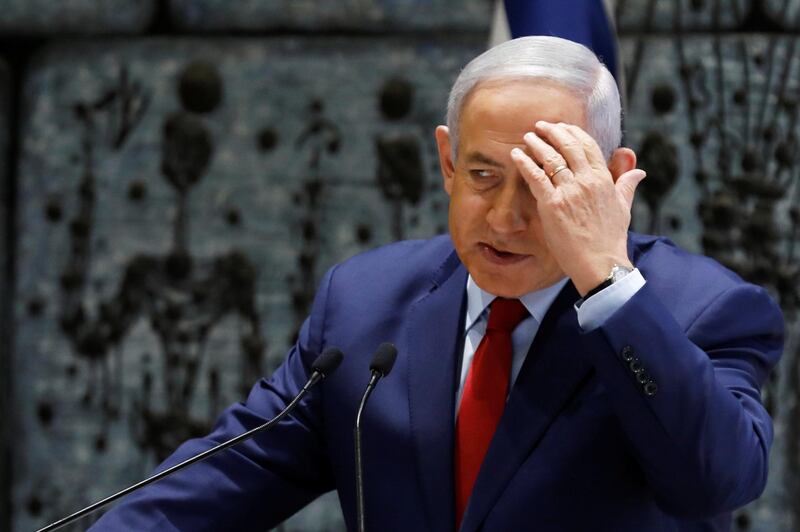Israeli Prime Minister Benjamin Netanyahu’s ruling coalition collapsed on Monday, with the announcement it was dissolving parliament and calling early elections in April.
Following a meeting of the heads of coalition parties, a statement announced they had “unanimously agreed to dissolve the Knesset [parliament] and go to a new election at the beginning of April”.
Mr Netanyahu’s coalition fell apart over a proposed bill ordering military conscription for ultra-orthodox Jews, just weeks after it appeared on the brink of collapse over a ceasefire deal with the militant group Hamas in Gaza.
Now in his fourth term as prime minister, he will go to the polls facing the possibility of being charged with bribery and corruption in three separate cases. The attorney general has not yet decided whether to act on police recommendations that he be indicted.
Mr Netanyahu has been governing with a single-seat majority in the 120-member parliament since mid November, when Avigdor Lieberman resigned as defence minister and withdrew his Yisrael Beitenu party from the ruling coalition because of what he said was the government's weak response to rocket attacks from Gaza. The Jewish Home party leader Naftali Bennett appeared set to follow suit but then said he would give Mr Netanyahu another chance.
But on Monday, after failing to garner enough votes to pass court-ordered legislation to draft ultra-Orthodox Jews into the military, Mr Netanyahu’s Likud party said “national and budgetary responsibilities” compelled the calling of early elections.
Mr Netanyahu’s ultra-Orthodox coalition partners have resisted conscription and demanded the weakening of the draft bill, while on Wednesday the leader of the opposition Yesh Atid party withdrew support, calling the coalition’s hoped-for compromise a payoff to draft dodgers.
Polls suggest Mr Netanyahu’s right-wing Likud party is likely to remain the largest in Israel, while he remains the preferred choice for prime minister, far ahead of other contenders. Another victory for Mr Netanyahu would assure him a place in history as Israel’s longest-serving leader.
Although elections were not due till November next year, holding them early is likely to be favourable to the incumbent prime minister, according to analysts.
"Netanyahu will enter those elections as a prime minister, minister of defence and minister of foreign affairs," Elizabeth Tsurkov, a research fellow at the Israeli think tank Forum for Regional Thinking told The National. "The minister of defence role allows Netanyahu to do photo-ops with IDF [Israeli Defence Force] soldiers and commanders and exploit the popularity of the IDF for his campaign."
Holding elections while the possibility of criminal charges hang over Mr Netanyahu will allow him to claim the Israeli public voted for him with full knowledge of the allegations, Ms Tsurkov said. “And hence, deposing him from the prime minister’s position would be undemocratic.”
The calling of early elections could delay the advancement of any US peace plan however. Israeli media reported last month that Mr Netanyahu wanted to delay the Trump administration’s much vaunted Israeli-Palestinian peace plan, fearing its release before the elections could hurt his election chances. “I suspect it won't be unveiled until after the elections, but it's hard to be certain with this unpredictable administration,” Ms Tsurkov said.
Though the specifics of the peace plan have not been publicised, and Palestinian officials have outright rejected it in advance, Donald Trump has promised a "deal of the century" to resolve the conflict. With Mr Netanyahu remaining one of Mr Trump's staunchest international allies, the US administration will look to follow developments closely.
Addressing reporters on Monday, Mr Netanyahu looked confident of making history next year, saying he hoped to form a similar right-wing coalition. “The current coalition is, in my eyes, the core of the next coalition," he said.
_______________
Read more:
[ Palestinians can expect another year of Trump betrayal in 2019 ]
[ Lebanon says Netanyahu is hiding behind tunnels to deflect from domestic woes ]
Israeli police recommend indicting Netanyahu on bribery charges





